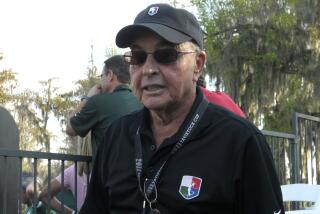Boesky Was Promised Safety Neton Guinness Deal, British Paper Says
- Share via
LONDON — Four businessmen convicted in Britain’s biggest financial scandal in decades shared a fatal flaw with some white-collar lawbreakers in America: They knew Ivan F. Boesky.
Boesky is the former arbitrager whose alleged lawbreaking set new standards for Wall Street corruption. He reportedly told U.S. authorities about alleged illegal action at Guinness PLC after his 1986 arrest.
A published report here gave new details about Boesky’s connection with the Guinness case, which involved an illegal scheme to help the brewery company take over a Scottish drinks company. The case resulted this week in prison terms, one longer than Boesky’s three-year sentence in the United States.
Boesky reportedly told police he was introduced to Guinness by Gerald Ronson, who was convicted Monday with three others on charges including stock manipulation, theft, false accounting and destroying documents.
Their trial centered on Guinness’ attempt to artificially boost its share price during a takeover battle with the food group Argyll for Scottish liquor maker Distillers Co.
Guinness’ $5.26-billion bid was successful.
Former Guinness Chairman and Chief Executive Ernest Saunders was sentenced Tuesday to five years and former stockbroker Anthony Parnes to 2 1/2 years for their part in the illegal share manipulation operation.
Ronson was sentenced to one year in prison and given the biggest fine in British history, $9.75 million (5 million pounds), for what the judge called “an attack on the integrity of the market.”
Sentencing of millionaire financier Sir Jack Lyons, 74, was postponed until Sept. 25, after he recovers from surgery.
According to Boesky, Ronson first contacted him about the Distillers bid in early April, 1986, and assured him that Guinness would “repay any losses” incurred in the deal, the Independent newspaper reported.
The report said Boesky later struck a deal with an American lawyer who served as a non-executive director of Guinness that he would be reimbursed by Guinness for losses on any share dealings connected with the bid.
He would also receive a monthly kickback fee of 5% on any sums invested, according to the newspaper, which said its report was based on notes from an interview British police held with Boesky in New York on Nov. 17, 1987.
By April 19, 1986, the day after Guinness won control of Distillers, Boesky had built up a holding of 14 million Guinness shares at a cost of about $80 million, the Independent said.
According to the newspaper, Boesky told the American lawyer, Tom Ward, that he lost $30 million after investing $1.1 million in support of the Distillers bid. Ward faces charges in Britain stemming from the Guinness case and has been fighting extradition after his October arrest in Washington.
The newspaper said Ward accepted the losses and suggested that Guinness reward Boesky by giving him a California vineyard or selling him property that had been undervalued.
But at Boesky’s suggestion, Guinness agreed against financial advice to invest $100 in Boesky’s limited partnership, the Independent said.
Boesky’s agreement to cooperate with U.S. and British authorities reportedly included a promise that he would not be prosecuted in Britain. No charges have been brought against him in Britain.
The newspaper said details of Boesky’s role in the Guinness case were obtained from “confidential documents not disclosed during the Guinness trial.”
Boesky pleaded guilty to one felony count for lying to federal investigators and paid $100 million in penalties to settle the biggest insider trading case in U.S. history. He was released on April 4 after serving two-thirds of his prison term.
Saunders and three other Britons are to stand trial later this year on further charges arising from the Guinness affair.
More to Read
Sign up for Essential California
The most important California stories and recommendations in your inbox every morning.
You may occasionally receive promotional content from the Los Angeles Times.










